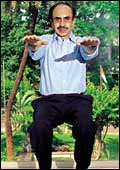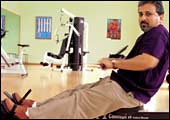|
Everyone
loved Sanjay Sharma. He was young (37), successful (head of a Rs
1,500-crore technology company) and witty (ha!). Analysts and investors
adored him for the results Techisus, the company he headed, clocked,
quarter after quarter. His employees were willing to walk on hot
coals for a CEO who worked hard, played harder, and showed the way
from the front. Even his competitors respected him. So, when Techisus
announced that it would merge with competitor Isometric Technologies
to create India's largest software services company, everyone was
happy. True, it would be tough, said analysts, but Sharma could
do it. The Techisus stock soared. "I am stepping down to accommodate
a better man," admitted Sanjay Mallik, the founder-CEO of Isometric.
The press conference to announce the integration
plan Sharma had drawn up was more like a gala. Mallik walked around
with a mile-wide grin on his face, looking every inch the father
of the bride, not someone giving up a corner-room office. And senior
employees of both Techisus and Isometric bunched around Sharma,
treating him, not like a successful tech-CEO but a rock star.
A hush fell over the assemblage as Sharma
strode up to the dais; the presentation was going to start and this
was bound to be interesting. A powerpoint slide appeared on the
giant screen behind him. Sharma cleared his throat, clutched his
chest and crumpled to the ground. A few senior Techisus execs tittered-their
boss was a bit of a prankster. Then Sharma's secretary, who had
rushed to the dais screamed. He was dead.
''Look at how fat he was," grinned
a still-fit-at-59 Mallik. "I am told he partied hard too; he
was a magnet for a heart attack.''
 |
| Reliance's Anil Ambani
runs 100 km a week, swims, works out in a gym and plays
polo. His tip: "Understand
the metabolic cycle of your body." |
If a business correspondent
rewrote The Ballad of a Thin Man that's probably how it would read-
tacky, melodramatic, moral, and very very real. In these insanely
competitive (and uncertain) times, one of the biggest threats to
a company comes not from without, but within. What if its CEO were
to suddenly die or take ill? What would happen to its long-term
strategies?
In March 2002, India's most respected deal-maker,
Nimesh Kampani, Chairman, JM Morgan Stanley, was laid low by a blood-
pressure related affliction. The man behind such mega-deals as the
Birla-AT&T-Tata merger, the Gujarat Ambuja-acc alliance and
the acquisition of a 10 per cent stake in L&T from the Ambanis
by the A.V. Birla Group was out of action for a couple of months.
By mid-year, Kampani was back, but only for two-to-three hours a
day at the office. Today, Kampani is back to what he knows best,
but the question is: did JM Morgan-which for three years was at
the top of the M&A sweepstakes-lose out in the dealmaking arena
during his absence? After all, Kampani is known to be a one-man
army, closing out deals on his own thanks to his rock-solid relationships
with industry stalwarts ranging from the Tatas to Kumar Birla to
the Ambanis.
JM Morgan officials will tell you that the
relationships have long since been institutionalised. There's Vice
Chairman P. Krishnamurthy, a veteran in the banking and investment
banking business, Kampani's son, Vishal, a director at the company,
and a clutch of go-getter VPs. The firm is probably right (although
we'd like to wait the year out): JM Morgan was still No 1 in the
M&A sweepstakes for the first half of the year, according to
India Advisory Partners, a firm that compiles the league tables.
But what if Kampani had been felled while this process was still
on?
 |
| Maruti's Jagdish Khattar
walks an hour every morning, weather be damned. Secret:
when travelling, he hits the treadmill in the evening |
And continuing that theme, what if Jack Welch
hadn't made it through his successful triple bypass in 1995? And
what if Intel's chairman Andy Grove hadn't fought prostate cancer
successfully? Aditya Vikram Birla didn't and the family didn't even
share the information that he had the disease with investors-despite
several of the group's companies being listed. His father B.K. Birla
pooh-poohed a report that the man had prostate cancer and claimed
he was recovering from a ''slipped disc''. Welch and Grove, in contrast,
had made no efforts to hide their ailments.
"CEO fitness is definitely a subject of
concern for investors," says Ramdeo Agrawal, Director, Motilal
Oswal Securities. "It would bother me if the CEO looked unfit,
if he is ill, or if his longevity is in doubt." Some of this
concern can be attributed to the fact that many Indian companies
are still owned and managed by one family. As for the rest, put
it down to the increasing importance of chief executives and the
role they play. "Being in the right physical condition might
just make the difference between taking the right decision or the
wrong one in an important deal," says Suresh Vaswani, President,
Wipro Infotech. Adds Tata Sons Chairman Ratan Tata, "It is
important that an optimum state of well being and health is maintained
as it is one's responsibility to all stakeholders." The strong,
as the saw goes, shall live.
THE BODY BEAUTIFUL
Four years ago at an investors forum in New
York an analyst asked Reliance's Anil Ambani (rather cuttingly)
on how he could be trusted to manage a huge business when he so
obviously couldn't take care of his own fitness. Ambani weighed
in at over 100 kg then; today, he does 62. The analyst's question
was justified. CEO fitness is very much part of the American track-and-be-tracked
investing culture. "There is more respect for a CEO with stamina
and energy," says Confederation of Indian Industry Director
General Tarun Das.
 |
| Dr Reddy's Lab's Satish
Reddy hits the gym at Hyderabad's Taj Krishna thrice
a week. "Being in: the
healthcare business, we have to take fitness seriously." |
Whether it is Ambani, a self-confessed health
freak who runs an average of 100 km a week, Godrej Soaps Chairman
Adi Godrej who swears by isometric exercises and water-skiing, rpg
Enterprises Vice Chairman Sanjiv Goenka who spends an hour a day
at the gym, Aditya Birla Group Chairman Kumar Mangalam Birla who
does free-hand aerobics, yoga, and a light weights regimen every
morning, or the car-maker-who-walks, Maruti Udyog CEO Jagdish Khattar,
an increasing number of Indian CEOs is waking up to the part fitness
plays in their organisational lives.
"Exercising, especially yoga has helped
me stay fit," says Asian paints CEO Ashwin Dani, a yoga buff.
"It has helped me put in long hours at work." Adds Kinetic
Engineering's Joint Managing Director Sulajja Firodia Motwani who
runs 30-40 km a week and has her own personal fitness trainer, "It's
important to be fit; if you have a fit body, a fit mind follows."
Things still haven't reached the point they have in the West where
most senior executives are conscious of their level of physical
fitness. "Many senior executives in the West worry about health,"
says Arun Kumar, CEO, Hughes Software Services. "A lot of that
has to do with preventive care and the same awareness is coming
to India."
 |
| Look Ma, no gym. That's what Godrej Soap's
Adi Godrej seems to be saying
as he does some isometrics@
work. |
It certainly has dawned upon head-hunters. "It
is not that we grill CEO-candidates on fitness when we meet with
them," explains Korn/Ferry International CEO Deepak Gupta,
"but it is there at the back of our minds." "If the
person is sloppy or grossly overweight, a red flag does go up."
And Stanton Chase CEO R. Suresh offers an instance where he didn't
recommend a CEO-candidate to a company because "we had some
concerns about his health and when we went to a party we knew he'd
surely attend, we saw him eat too much, drink too much, and smoke
too much". "We do not specifically measure fitness levels
in choosing a CEO," says Tata. "However, it is inevitable
that the high levels of fitness translate into high levels of energy
and dynamism-key attributes we look for in CEOs."
Still, India Inc's discovery of the body beautiful
isn't universal. Several chief executives BT contacted refused to
speak on the subject of fitness, perhaps out of fear of embarrassing
themselves. And even CII's Das believes disclosure norms on CEO
health may be "taking things to ridiculous levels". "What
do you tell them? That you've got flu?" Only, it isn't merely
a question of personal embarrassment but of shareholder well-being.
"If we get the feeling that the CEO is unwell we immediately
look at the depth of the company's leadership," says a Mumbai-based
analyst. Adds Jigar Shah, the head of research at K.R. Choksey &
Company, "The CEO's health is very important, but we may not
find the information we want easily; we can only observe or ask
indirect questions."
 |
| Wipro's Suresh Vaswani
has an ace up his sleeve: the well-appointed
gym at the company's corporate office. Pity he travels
so much. |
Shah's concern may be addressed sooner than
he thinks. "A company must inform the stock exchanges (read:
investors) on the health of its CEO and key executives," says
Reliance's Ambani. And SEBI's committee on corporate governance
(See The Market Must Know) is considering making such disclosures
mandatory. Maybe that'll liven up those boring analyst meets some.
reported by Brian Carvalho,
Roshni Jayakar, Seema Shukla, Abir Pal, Abha Bakaya, Vinod Mahanta,
Venkatesha Babu, Suveen K. Sinha, & E.K. Sharma
To read about the work-out
routines of individual CEOs and for an exclusive CEO fitness regime
developed for BT by Gold's Gym, Mumbai, go to www.business-today.com
1
2
|

